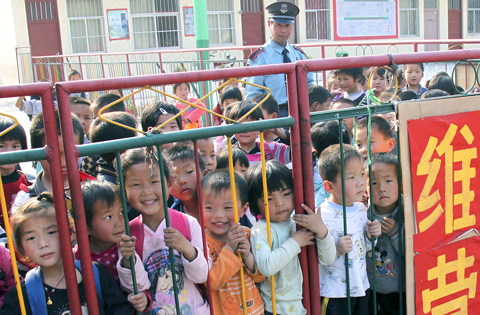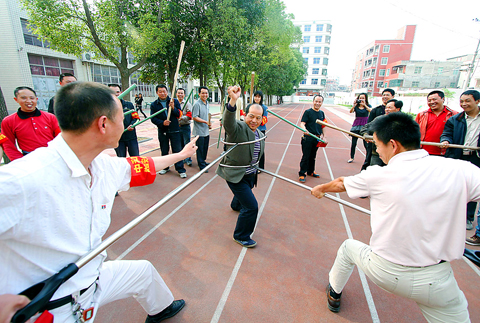Villagers thought him gentle and kind; and one generous act stood out above the rest. In his 20s, Wu Huanming (吳煥明) took in a young disabled boy he found on the streets.
“The child was always warmly and newly dressed. Any time he caught a cold, Wu would rush him to the doctor. He took great care of him, but when people asked why, he just said the kid brought him luck,” a neighbor said.
On Wednesday morning, however, the tender-hearted man hacked to death seven kindergarten pupils, their teacher and her mother, wounding 11 more three to six-year-olds.

PHOTO: REUTERS
The assault in Lincheng village, Hanzhong, Shaanxi Province, would horrify any community. It is all the more shocking because it is China’s fifth such attack on young children since late March. In all, 15 have been killed and 60 injured.
That this attacker was successful and well-liked makes it all the more incomprehensible.
That many of his victims were their parents’ only children, thanks to China’s birth control policies, underscores its cruelty. In minutes, he destroyed the center of his friends’ and neighbors’ lives.

PHOTO: AFP
“They were so young and innocent,” one shocked mother said as her “active, outgoing” daughter lay unconscious on a hospital bed.
“We still don’t know how serious the injuries are and fear she will suffer lasting trauma. How will she be able to spend the rest of her life?” she asked.
Wu knew the little girl, as he did many of his victims; the family considered him a friend and he often dropped in to chat. Now they feel only hatred.
“If he were still alive, we would all have used our knives to hack at him, one by one, until he too was dead,” her grandmother said.
The trigger for his violence appears banal: a property dispute. Wu, 48, had rented a house to the kindergarten and wanted it to move out when the lease expired last month. Wu Hongying (吳宏英), the teacher, wanted to stay until summer.
The disagreement erupted into an open row this week. Too scared to intervene, neighbors shut their doors when Wu ran back to his house and grabbed a meat cleaver.
Tall and powerfully built, he quickly overcame the 50-year-old teacher and attacked her 80-year-old mother.
Then, raining blow after blow upon their heads, he wounded or killed every child attending class that day. Most seem to have been rooted to the spot in shock. One little boy, despite his injuries, escaped to raise the alarm.
Villagers said their legs buckled when they entered the blood-soaked kindergarten room. Children lay motionless upon or underneath desks. Another was slumped by the door, with a long, 3cm wide wound across her scalp.
By then, Wu had returned home. His cousin has reported seeing the killer standing on his balcony, smoking a cigarette as he watched villagers rush to rescue the children. Then he went inside and killed himself. Officials have responded to the epidemic of violence in China with high-profile security measures.
In Changsha, Hunan Province, police officers with submachine guns are reportedly guarding some kindergartens. Chongqing has pledged to spend 1.2 billion yuan (US$175.7 million) on extra police patrols and security guards.
Hanzhong had stationed 2,000 extra police officers and guards around the city’s schools two days before Wu’s attack; the kindergarten, small and privately run, appears to have been unprotected.
Police have since set up roadblocks around the village and residents reported patrols through the night.
There is a heavy police presence outside the hospitals treating injured children.
Some journalists in the area were followed or stopped and relatives said they had been ordered not to speak to reporters. Though some talked to the Guardian, none would be identified.
At one hospital, an official interrupted a man’s description of his grandson with the order: “Don’t tell them anything.”
Domestic media coverage relating to recent attacks has given minimal detail of incidents, instead focusing on preventive measures.
There is undoubtedly real concern that reports will spark further copycat assaults, but many experts argue that must be balanced with the public’s right to know; several Hanzhong residents were unaware of the recent attacks. Others believe more open discussion would help to ensure security measures are matched by efforts to address underlying causes.
“It’s not that [China’s leaders] are immune or unconcerned or not in anguish. I think it has to do with trying to figure out what they need to do about it,” said Russell Leigh Moses, a Beijing-based political analyst, of the government’s focus on protecting schools.
Some experts have pointed to the desperate need to improve awareness of and treatment for mental illness in China. Others warn that rocketing inequality, allied to massive social change, is leaving many citizens bewildered and alienated.
However, though Lincheng is poor — many from the village become migrant workers, with several parents traveling hundreds of kilometers to their children’s bedsides this week — Wu was one of Lincheng’s wealthiest residents. Unlike other recent attackers, portrayed as unsuccessful loners, the tree merchant had a wife and family; his biological son is now a university student.
Last month he told a villager that he had become ill and could no longer work; there are rumors he had cancer and believed it terminal.
He had complained of sleeplessness and a relative told reporters that he had been “talking nonsense ... like he was unbalanced.”
He had no history of mental problems. Perhaps there are no real explanations for Wu’s act.
At one hospital, red-eyed parents leaped to their feet for a glimpse as orderlies pushed three victims from surgery to intensive care.
The children’s heads, though doubled in size by thick bandages, were tiny upon the pillows. A little hand fell limply from beneath a blanket.
The suffering of children brings anguish anywhere, but in China, they are particularly precious because of the importance of continuing family lines, experts said.
“Children are the most important part of the family because the one-child policy is so strict these days,” one survivor’s grandmother said.
In Lincheng, family planning injunctions are painted upon the walls.
One includes the government promise: “Children will be happy all their lives.”

Archeologists in Peru on Thursday said they found the 5,000-year-old remains of a noblewoman at the sacred city of Caral, revealing the important role played by women in the oldest center of civilization in the Americas. “What has been discovered corresponds to a woman who apparently had elevated status, an elite woman,” archeologist David Palomino said. The mummy was found in Aspero, a sacred site within the city of Caral that was a garbage dump for more than 30 years until becoming an archeological site in the 1990s. Palomino said the carefully preserved remains, dating to 3,000BC, contained skin, part of the

TRUMP EFFECT: The win capped one of the most dramatic turnarounds in Canadian political history after the Conservatives had led the Liberals by more than 20 points Canadian Prime Minister Mark Carney yesterday pledged to win US President Donald Trump’s trade war after winning Canada’s election and leading his Liberal Party to another term in power. Following a campaign dominated by Trump’s tariffs and annexation threats, Carney promised to chart “a new path forward” in a world “fundamentally changed” by a US that is newly hostile to free trade. “We are over the shock of the American betrayal, but we should never forget the lessons,” said Carney, who led the central banks of Canada and the UK before entering politics earlier this year. “We will win this trade war and

‘BODIES EVERYWHERE’: The incident occurred at a Filipino festival celebrating an anti-colonial leader, with the driver described as a ‘lone suspect’ known to police Canadian police arrested a man on Saturday after a car plowed into a street party in the western Canadian city of Vancouver, killing a number of people. Authorities said the incident happened shortly after 8pm in Vancouver’s Sunset on Fraser neighborhood as members of the Filipino community gathered to celebrate Lapu Lapu Day. The festival, which commemorates a Filipino anti-colonial leader from the 16th century, falls this year on the weekend before Canada’s election. A 30-year-old local man was arrested at the scene, Vancouver police wrote on X. The driver was a “lone suspect” known to police, a police spokesperson told journalists at the

North Korean leader Kim Jong-un has unveiled a new naval destroyer, claiming it as a significant advancement toward his goal of expanding the operational range and preemptive strike capabilities of his nuclear-armed military, state media said yesterday. North Korea’s state-run Korean Central News Agency (KCNA) said Kim attended the launching ceremony for the 5,000-tonne warship on Friday at the western port of Nampo. Kim framed the arms buildup as a response to perceived threats from the US and its allies in Asia, who have been expanding joint military exercises amid rising tensions over the North’s nuclear program. He added that the acquisition